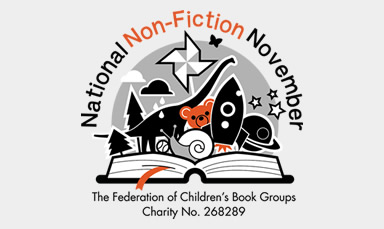National Non-Fiction November
Resource type: Event
Price band: Free
Key stage: KS1, KS2, KS3
Region(s): All of UK
National Non-Fiction November was set up by the Federation of Children’s Book Groups as a way to highlight the importance of information books and to promote reading non-fiction for pleasure.
Each year, National Non-Fiction November has a different theme. The theme for 2024 is Why Don’t You…? and is designed to stimulate discussion around hobbies and leisure activities and to encourage young people to try something new.
The FCBG website provides resources to support National Non-Fiction November 2024, including:
- A themed booklist.
- Ideas and activities to support National Non-fiction November 2024.
- A competition inviting children aged 5-12 to create a short advert for their hobby. The advert can be in a variety of formats and the deadline for entry is 2nd December.
- A one-day Non-Fiction conference in Somerset. Further details to be announced.
About The Federation of Children’s Book Groups: The FCBG is an umbrella organisation that coordinates and supports the work of local Children’s Book Groups across the UK. As well as events for parents and children organised at a local level, the FCBG also organises the FCBG Children’s Book Award and other national events to help bring children and books together.
Further resources:
- Join author Frances Durkin for a free online workshop exploring the lives and discoveries of some of the amazing female scientists featured in her book EUREK-HER: Stories of Inspirational Women in STEM on 19th November. Suitable for pupils aged 7-11.
- Discover that the real world is far more amazing than anything you can make up at a free online event with What on Earth! authors Christopher Lloyd, Andrew Pettie and Letizia Diamante on 28th November. Learn fascinating facts about space, technology, nature, animals and more, and test your knowledge with a mind-boggling quiz. Suitable for pupils aged 8+.
- Find out more about the impact of non-fiction on young people’s motivation to read and their engagement with the world around them in this report by the National Literacy Trust.
- Andy Seed, best-selling author of the Interview with a… series, has some tips on how to use factual book to get young people reading.
- Are we enjoying A Golden Age of Non-fiction? This blog by Nikki Gamble of Just Imagine explores some of the features of good non-fiction writing and provides tips on what to look for when choosing non-fiction books for your library.
- Look out for the shortlist announcement of the Young People’s Book Prize on 8th November and the winner announcement for this year’s SLA Information Book Award at the end of the month. Other book awards for non-fiction include the UKLA Information Book Awards, The Week Junior Book Awards and the English 4-11 Picture Book Awards.
- Good sources of recommendations for non-fiction books include CLPE’s CoreBooks and Books for Topics. LoveReading4Kids have also produced a list of 100 Great Non-Fiction Books for children of all ages.
- Find non-fiction recommendations for young people by young people in this booklist from book review site Toppsta.
- Consider adding an age-appropriate newspaper and/or a non-fiction magazine to the library to provide a wide range of reading material for your students. Choose from a selection here.
- Don’t forget that non-fiction authors also do author visits and workshops. Authors Aloud and Authors Abroad both have non-fiction authors on their books and can help arrange a visit that fits your needs.
Visit the resource
Contact Details
Rate this resource
Click on the star to rate it!

